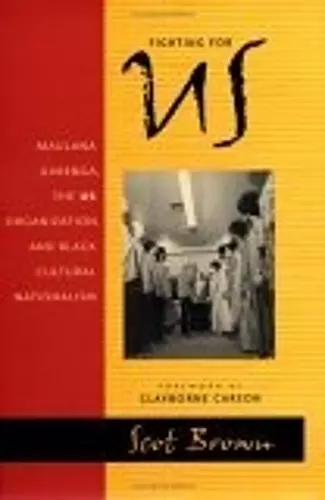Fighting for Us
Format:Paperback
Publisher:New York University Press
Published:1st Mar '05
Currently unavailable, and unfortunately no date known when it will be back

The untold story of the Black nationalist group behind the growing popularity of Kwanzaa
In spite of the ever-growing popularity of Kwanzaa, the story of the influential Black nationalist organization behind the holiday has never been told. Fighting for Us explores the fascinating history of the US Organization, a Black nationalist group based in California that played a leading role in Black Power politics and culture during the late 1960s and early ‘70s whose influence is still felt today. Advocates of Afrocentric renewal, US unleashed creative and intellectual passions that continue to fuel debate and controversy among scholars and students of the Black Power movement.
Founded in 1965 by Maulana Karenga, US established an extensive network of alliances with a diverse body of activists, artists and organizations throughout the United States for the purpose of bringing about an African American cultural revolution. Fighting for US presents the first historical examination of US’ philosophy, internal dynamics, political activism and influence on African American art, making an elaborate use of oral history interviews, organizational archives, Federal Bureau of Investigation files, newspaper accounts, and other primary sources of the period.
This book also sheds light on factors contributing to the organization's decline in the early ‘70s—government repression, authoritarianism, sexism, and elitist vanguard politics. Previous scholarship about US has been shaped by a war of words associated with a feud between US and the Black Panther Party that gave way to a series of violent and deadly clashes in Los Angeles. Venturing beyond the lingering rhetoric of rivalry, this book illuminates the ideological similarities and differences between US's “cultural” nationalism and the Black Panther Party's "revolutionary" nationalism. Today, US’s emphasis on culture has endured as evidenced by the popularity of Kwanzaa and the Afrocentrism in Black art and popular media. Engaging and original, Fighting for US will be the definitive work on Maulana Karenga, the US organization, and Black cultural nationalism in America.
"A detailed and sober account . . . Fighting for US is of enormous and permanent value." * Publishers Weekly *
"Readers will find Brown's study a well-researched document on the key era of the 1960s and 1970s, and it will serve as a guide to other scholars as more students of the freedom era take up the challenge to study and explore this rich period in our nation's history." * American Studies *
"Scot Browns Fighting for Us reveals a dimension of black cultural nationalism that, perhaps more than any other of recent decades, has been in need of sustained scholarly attention. A valuable study." -- Sterling Stuckey,author of Slave Culture: Nationalist Theory and the Foundations of Black America
"The Us Organization practically defined black cultural nationalism in the 1960s and 1970s, yet we know so little of its history and ideology. Thanks to Scot Brown's subtle and penetrating portrait of the movement and the man behind it, Maulana Karenga, we now have a more complete picture of the period. Fighting for Us will force us all to rethink our assumptions about black cultural nationalism and the Black Power era." -- Robin D. G. Kelley,author of Freedom Dreams: The Black Radical Imagination
"What a fascinating tour through the theory and praxis of Black Power! I'm immensely grateful to Scot Brown for his fine analysis of the intellectual basis of the Us Organization as well as its actions in the 1960s and 1970s. Fighting for Us does more than situate Maulana Karenga in his various contexts. The book also explains the shifting collaborations and conflicts of the era's Black Power groups with remarkable clarity." -- Nell Irvin Painter,author of Sojourner Truth, A Life, A Symbol and Southern History Across the Color Line
ISBN: 9780814798782
Dimensions: unknown
Weight: 386g
228 pages